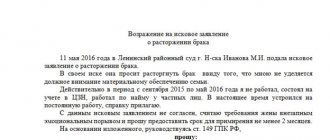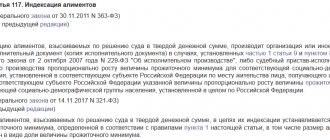The first step towards depriving a parent of his rights may be a statement of claim for restriction of parental rights. This is not a required step. An interested person can immediately file a claim for deprivation of parental rights. When there are sufficient reasons for this. And when there are no such grounds, but there is abuse of their rights by one parent, you can start with restrictions. Sometimes the court, when considering claims for deprivation, independently decides on the restriction.
At its core, such a claim means deprivation of the right to personal education. The law contains requirements for the circle of persons who have the right to raise such a question before the court. There are special requirements for the content of the claim and evidence. The requirement to limit parental rights must stem from the need to protect the rights and needs of the child.
:
Statement of claim for restriction of parental rights
Restriction and deprivation of parental rights: differences
Limitation of parental rights is a procedure that eliminates the negative influence of a parent on a child. It is usually used before deprivation, when the court considers that there are not enough grounds for the latter and it is necessary to give the mother or father a chance to reform.
After the court decision enters into legal force, the child is transferred to the guardianship authorities. The maximum period of restriction is 6 months, after which the POiP body files another claim - for deprivation. This is done if the parent does not change his behavior, and leaving the minor with him is not possible (Article 73 of the RF IC).
Expert commentary
Kamensky Yuri
Lawyer
Deprivation of parental rights is a more severe measure. It applies if the restriction did not produce results and the parent has not corrected himself, or if the latter committed an act for which preliminary deprivation is impossible.
To understand the difference, it is recommended to familiarize yourself with the table of differences:
| Criteria | Deprivation | Limitation |
| Period | Indefinitely or until the child reaches adulthood, when he has the right to independently choose whether to communicate with his parents | Up to six months |
| Possibility of receiving child support from a child | Cancelled | Saved. Alimony is awarded only from adult able-bodied citizens |
| Opportunity to see each other | Absent | Retained if the court considers that the meetings will not have a negative impact on the minor |
| Categories of plaintiffs | Parents, guardians, adoptive parents, OOiP, prosecutor's office | Parents, close relatives, prosecutor, teachers and medical workers |
| Reinstatement of rights | Allowed if the court finds that the parent’s behavior has changed and does not pose a threat to the child | |
| Right to child's property | Cancelled | Those with limited parental rights can claim the child’s property in the event of his death |
| Base | Committing actions directed against a child, both with and without guilt | Committing culpable acts |
Expenses
Requirements for the suspension of parental rights, based on its inextricable connection with the process of upholding the rights of the child, should not be subject to state duty, which is confirmed by the norms of the Tax Code of the Russian Federation. Consequently, as such, large formally defined investments in this procedure are not provided for in practice.
The same cannot be said about the procedure for terminating the category of rights under consideration. Here, on a legal basis, funds are collected and sent to the local budget at the place where the legal fact is being considered. Most likely, this is due to the irreversibility of the current legal situation and without a preliminary deposit of funds (300 rubles), the procedure cannot begin.
We suggest reading the following articles:
- Children left without parents.
- Establishing kinship.
- Rights and responsibilities of children and parents, including during divorce and civil marriage.
- Maintenance of parents for adult children.
Grounds for restricting parental rights
The basis may be circumstances that pose a threat to the psychological or physical health of the minor if the court considers that leaving the child with the parent is not possible until the reasons are eliminated (Article 73 of the RF IC).
Such circumstances include the following:
- Alcoholism, drug addiction, immoral behavior, improper child care or education, frequent leaving of a minor alone;
- Mental disorders, serious illness of a parent and other difficult life situations.
Expert commentary
Gorbunova Olga
Lawyer
The main criterion here is the absence of grounds for deprivation. If they exist, it is deprivation that is carried out, not restriction. For example, for this it is sufficient to commit a deliberate crime against a child or his mother (father), beating, obstruction of education, malicious evasion of alimony payments, attempt on sexual integrity and other reasons specified in Art. 69 RF IC.
How to collect evidence?
To carry out proof in court, it is advisable to use documents, the inclusion of which will make it possible to clarify disputes arising in the process.
What documentation will be required to confirm the validity of the reasons for suspending the rights of parents or refuting the charges is described in the table below:
| Base | Documentation |
| Nervous disorder, serious illness | Medical certificate |
| Alcoholism, drug addiction | Certificate from the dispensary, certificate of coding, testimony of witnesses, certificate of treatment at a rehabilitation center |
| Child neglect | Certificate and characteristics from the place of study, certificate from the clinic, testimony |
| Difficult life circumstances | Act of the authorized body, explanations of witnesses, certificate from the employment service |
| Cruelty | Certificate from a medical institution, psychologist’s report, police/precinct report, witness statements, conviction |
| Refusal to support a child, non-payment of alimony | A resolution to initiate proceedings in the case, a certificate of calculation of the debt for cash payments, testimony of witnesses, a recording of negotiations and a written request for financial assistance |
How to limit a parent’s rights to a child: step-by-step instructions
First, the initiator needs to determine whether there are grounds for the restriction. This procedure has three main goals, which can be used both in combination and separately:
- Parental warning. As mentioned earlier, restriction is most often a preventive measure, meaning that if repeated offenses are committed, deprivation will follow. This is done so that the parent can understand the situation and take measures to prevent the child from being removed forever.
- Punishment. If the reason for the restriction is an offense that threatens the life of a minor, the mother or father must take measures to prevent this from happening again when the child is returned.
- Upbringing. Often citizens are deprived of their rights to children due to their poor financial situation, as a result of which they cannot provide them with basic things and food. Time is given to them to correct the situation, so that after the return the child lives in normal conditions.
The procedure itself from the initiator’s side looks like this:
- Documents are being collected. If you have previously contacted the guardianship authorities with a problem, you will need the appropriate certificates. A certificate of living conditions will also be required from the POiP.
- A statement of claim is being drawn up. Subsequently, it is submitted to the court along with other documentation confirming the existence of grounds for the restriction.
- The claim is accepted by the judge for proceedings within 5 days. The parties are notified in writing of the scheduled court hearing.
- On the date specified in the notice, the plaintiff and defendant appear before the judicial authority, and a hearing on the case is held. The parties have the right to request the calling of witnesses and present evidence indicating their case.
As a result, a decision is made to limit rights. Within three days, an extract from it is sent to the registry office for entering the relevant information into the documents.
Where to contact
City or district courts deal with cases of restriction of parents' rights.
The claim should be filed at the defendant's registered address. If he is unknown, at the location of his property. If for some reason the plaintiff cannot send a claim to the judicial authority at the place of registration or location of his real estate, documents are submitted to the court at his registered address, but justification will be required: illness, lack of money to travel to another area.
Important! When filing a claim for the collection of alimony or a penalty for it, simultaneously with the restriction, it is allowed to file a claim at the plaintiff’s place of residence. In such a situation, the choice is given to him.
Documentation
When filing a claim, the following documents are submitted:
- plaintiff's passport;
- receipt of payment of state duty;
- child's birth certificate;
- characteristics of the plaintiff and defendant from their places of residence or work (the specific type of characteristics depends on the situation);
- extract from the house register;
- an act from the POiP on the living conditions of the minor.
Documentary evidence will also be required to support the grounds for deprivation. For example, this could be a medical report about the presence of a mental illness in a parent, a certificate from the police about systematic domestic proceedings and evasion of obligations to raise a child, etc.
State duty
According to Art. 333.19 of the Tax Code of the Russian Federation, plaintiffs in cases of restriction of parental rights are subject to a state duty in the amount of 300 rubles. Subsequently, it is recovered from the defendant. If the requirements reflect the collection of alimony , the plaintiff does not pay the fee - it is collected from the defendant (150 rubles).
How to file a claim
In civil legislation, unified forms of claims are not established, but they must comply with the requirements of Art. 131 Code of Civil Procedure of the Russian Federation. To apply for a restriction, the following information must be included in the application:
- name of the judicial authority;
- Full name, registration addresses of the plaintiff and defendant;
- passport details and telephone number of the plaintiff;
- full name of the territorial unit of the OOiP;
- description of the circumstances: on what basis is it necessary to limit the parent’s rights to the child, what is his fault, in what situation and with whom is the minor at the time of filing the claim;
- Full name, series and number of the child’s birth certificate;
- claims: for restriction of rights, collection of alimony, deprivation of rights to benefits for citizens with children, for preserving the child’s right to use the defendant’s real estate (address indicated);
- determining the procedure for communicating with the child: with the permission of the guardianship authorities, guardians, etc.;
- a list of the attached documentation;
- signature and date of preparation.
When filling, you must use a black or blue pen. Indicating information with felt-tip pens, markers or pencils is not allowed.
Citizens can also fill out claims directly in court, but, as a rule, they are referred to lawyers who provide such services for money, because The duties of court employees do not include assistance in paperwork.
Example of a statement of claim
Statement of claim for restriction of parental rights
I am the grandmother of Svetlana Petrovna Lebedeva, born in 2006, who currently lives with her mother, Alena Pavlovna Lebedeva (defendant). My son, Petr Nikolaevich Lebedev, who is Veronica’s father, died in 2011. After his death, the defendant began to periodically drink alcohol and lead an antisocial lifestyle.
As a result of her behavior, she contracted tuberculosis. The disease was diagnosed on January 12, 2020 in the Kytmanovsky district hospital, about which there is a corresponding conclusion. She did not complete the course of treatment and is not completing it, despite repeated visits by Rospotrebnadzor. Due to the above circumstances, I am afraid of the development of her illness and the danger to others, including my granddaughter Svetlana.
The mother of the child, in violation of Art. 65 of the Family Code does not fulfill his parental responsibilities to ensure physical, moral, and spiritual development.
In addition, the mother's antisocial behavior negatively affects the development of the child's personality. And I am not able to resist him. In March 2021, the granddaughter (child) was registered with the commission on juvenile affairs. At the same time, it was I, not my mother, who came to talk with the police officer. Over the past year, my granddaughter’s academic performance has decreased significantly.
In accordance with Part 5 of Art. 73, paragraph 2 of Art. 74 of the Family Code of the Russian Federation, restriction of parental rights also implies the collection of alimony for the maintenance of a child and does not relieve one from such an obligation.
To confirm the stated circumstances, I ask you to call witnesses to the court - neighbors of A.P. Lebedeva: Viktor Ignatievich Krotov (Kytmanovo village, Kurganova St., 4), Inna Vasilievna Petrenko (Kytmanovo village, Kurganova St., 3) , school director Lidiya Ivanovna Petrenko (Kytmanovo village, Lenina St., 12), interview Rospotrebnadzor employees in the district.
In connection with the above, guided by Art. 73 RF IC, art. 131-132 Code of Civil Procedure of the Russian Federation,
- Restrict Alena Pavlovna Lebedeva, born on May 12, 1991, place of birth: s. Kytmanovo, in parental rights in relation to Svetlana Petrovna Lebedeva, born May 12, 2006.
- To recover from Alena Pavlovna Lebedeva, born on May 12, 1991, a native of the village. Kytmanovo, alimony for the maintenance of Svetlana Petrovna Lebedeva in the amount of 1/4 of earnings from all monthly income.
- Birth certificate of Lebedeva S.P. (copy);
- A copy of the birth certificate of the father, Lebedev P.G.;
- Certificate from the Committee on Juvenile Affairs;
- Request for evidence
- Notification of sending the claim and documents to the defendant.
Consequences of the restriction
The main consequence for parents is the loss of the opportunity to communicate with their children if the educational institution or the court does not allow this. Also, citizens with limited rights are deprived of all benefits and benefits paid in the presence of children.
Expert commentary
Shadrin Alexey
Lawyer
The child retains the right of ownership of the residential premises in which he lived before the court decision entered into legal force. He will also be able to receive an inheritance in the event of the death of a parent.
Restoration of rights after restriction
Restoration of parental rights is allowed before the expiration of a six-month period at the request of a parent if the guardianship authorities establish that he has eliminated the reasons that served as the basis for going to court.
Important! If restoration is contrary to the interests of a minor and he is more than 10 years old, the court, when considering the relevant claim, may ask his opinion, if he and his legal representatives do not object to this.
Ultimately, if a positive decision is made, the parent whose rights were limited can again raise their son or daughter, as well as enjoy other rights established by the IC and the Civil Code of the Russian Federation.
Where is the claim filed?
Cases concerning parental rights are dealt with by district and city courts. Magistrate judges do not have the right to consider such claims.
Thus, a claim for restriction of parental rights is filed with the district or city court at the defendant’s place of residence.
If you have any questions about the correctness of drawing up such a statement of claim, or you are not sure about the choice of judicial authority, you can contact the territorial guardianship and trusteeship authority.
Specialists will not only help you fill out the application, but will also tell you where exactly you should file your claim, and also answer other questions on this topic.
Employees of the guardianship authorities can act as a third party at the court hearing and protect the interests of the child and the plaintiff.






